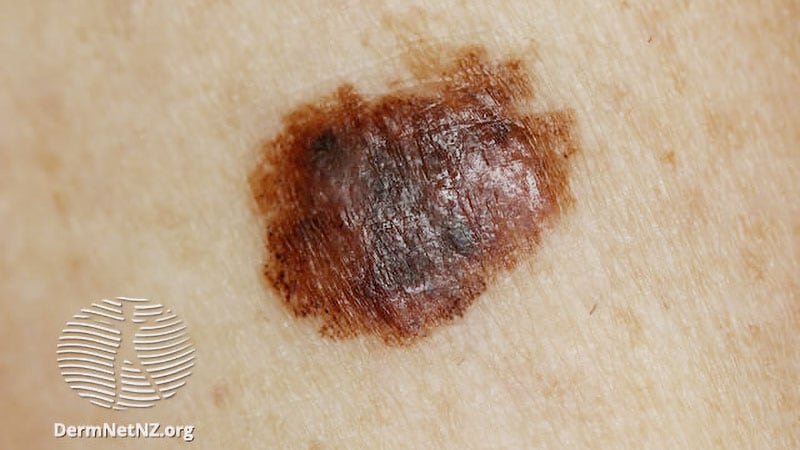Core Concepts
Melanoma in situ drives the majority of melanoma overdiagnoses, highlighting the need for intervention strategies.
Abstract
TOPLINE:
- Melanoma in situ is the primary driver of melanoma overdiagnoses.
METHODOLOGY:
- Concerns about overdiagnosis of melanoma have risen due to increased diagnoses in the US.
- Researchers collected data from the SEER 9 registries database.
- DevCan software was used to calculate the cumulative lifetime risk of melanoma diagnosis.
TAKEAWAY:
- Adjusted lifetime risk of melanoma in situ diagnosis increased significantly from 1975 to 2018.
- A large percentage of melanomas diagnosed in White individuals were overdiagnosed in 2018.
IN PRACTICE:
- Overdiagnosed melanomas are predominantly in situ cancers, suggesting a need for de-escalation of treatment intensity.
SOURCE:
- Research led by Adewole S. Adamson, MD, published in BMJ Evidence-Based Medicine.
LIMITATIONS:
- Analysis only included White individuals, with potential selection bias and assumptions about past diagnoses.
DISCLOSURES:
- Adamson and co-author Bell have funding support from respective foundations.
Customize Summary
Rewrite with AI
Generate Citations
Translate Source
To Another Language
Generate MindMap
from source content
Visit Source
www.medscape.com
Study Concludes Most Melanoma Overdiagnoses Are In Situ
Stats
"Between 1975 and 2018, the adjusted lifetime risk of being diagnosed with melanoma in situ increased from 0.17% to 2.7% in White men and 0.08% to 2% in White women."
"An estimated 49.7% and 64.6% of melanomas diagnosed in White men and White women, respectively, were overdiagnosed in 2018."
"Among individuals diagnosed with melanoma in situ, 89.4% of White men and 85.4% of White women were likely overdiagnosed in 2018."
Quotes
"A large proportion of overdiagnosed melanomas are in situ cancers, pointing to a potential area to focus for an intervention de-escalation of the intensity of treatment and survivorship care."
Key Insights Distilled From
by Doug Brunk at www.medscape.com 01-25-2024
https://www.medscape.com/viewarticle/study-concludes-most-melanoma-overdiagnoses-are-situ-2024a10001sp
Deeper Inquiries
How can healthcare systems address the issue of overdiagnosis in melanoma?
Healthcare systems can address the issue of overdiagnosis in melanoma by implementing strategies to improve diagnostic accuracy, such as utilizing advanced imaging techniques and molecular testing to differentiate between benign and malignant lesions. Additionally, educating healthcare providers and the public about the risks of overdiagnosis and the importance of evidence-based screening guidelines can help reduce unnecessary biopsies and treatments. Developing multidisciplinary tumor boards to review challenging cases and incorporating active surveillance protocols for low-risk lesions can also aid in preventing overdiagnosis in melanoma.
What are the potential implications of focusing on de-escalation of treatment intensity for overdiagnosed melanomas?
Focusing on de-escalation of treatment intensity for overdiagnosed melanomas can have several potential implications. It can help reduce unnecessary morbidity and healthcare costs associated with aggressive treatments for indolent lesions. By avoiding overtreatment, patients may experience fewer treatment-related side effects and complications, leading to improved quality of life. De-escalation of treatment intensity can also shift the focus towards personalized medicine, where treatment decisions are based on the individual's specific tumor characteristics and overall health status, promoting more tailored and effective care for melanoma patients.
How can the study's findings be applied to improve survivorship care in melanoma patients?
The study's findings can be applied to improve survivorship care in melanoma patients by informing the development of risk-stratified follow-up protocols. Identifying patients with overdiagnosed melanomas, particularly those with in situ lesions, can help healthcare providers tailor surveillance strategies to minimize unnecessary interventions while ensuring timely detection of disease progression. By recognizing the high proportion of overdiagnosed melanomas in certain populations, survivorship care programs can focus on providing appropriate support and resources for individuals who may experience psychological distress or uncertainty related to their diagnosis. Additionally, the study's findings can guide the implementation of survivorship care plans that emphasize holistic care, including psychosocial support, lifestyle interventions, and long-term monitoring for potential recurrence or new primary melanomas.
0
